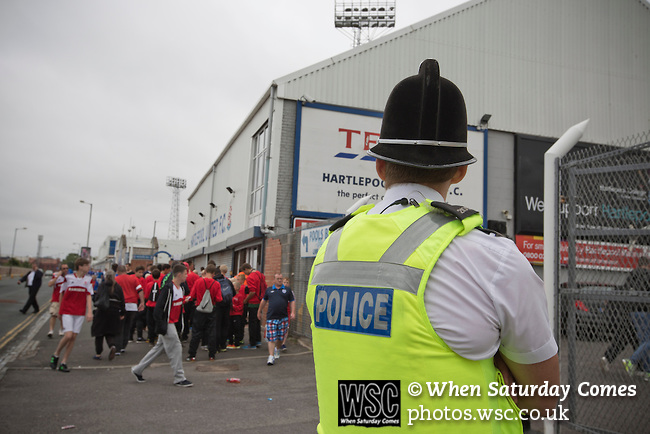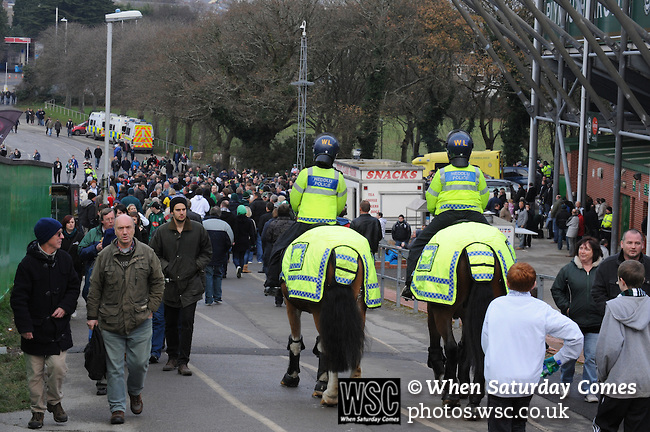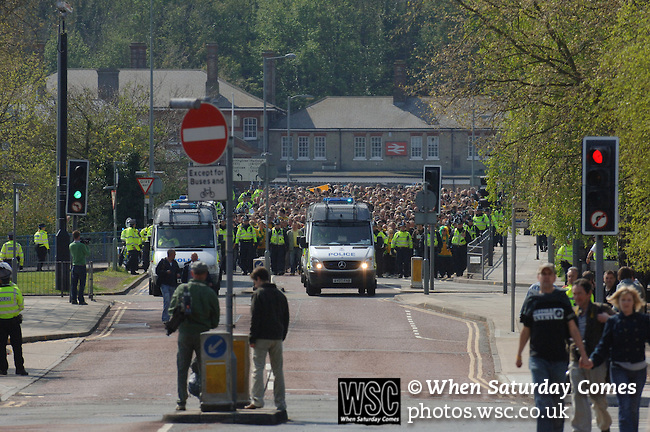
New figures show that football-related arrests remain at an all-time low, but the ever-increasing powers of FBOs have had a huge impact on supporters’ basic rights
25 November ~ This autumn the football banning order is 30 years old. The main target of Margaret Thatcher’s Public Order Act 1986 were striking miners (“the enemy within”) but hidden away in s.30 was a rather unusual power. The exclusion order was not aimed at flying pickets, but instead at football “hooligans”, who were occupying the front and back pages of newspapers all too frequently. A court now had the power, upon convicting an individual of a “football-related offence”, to issue an order that would exclude them from future matches. Furthermore, breach of this order was a criminal offence.
The football fan of the 1980s was to be the guinea pig for a hybrid legal power that combined the full force of the criminal justice system with the lesser protections for defendants provided by civil law. Nowadays we see these so-called “civil preventative orders” everywhere, applied for against those suspected of committing anti-social behaviour, child sex offences and terrorism. Some orders, such as the notorious ASBO, have been and gone, but the football banning order (FBO), as it is now known, has grown and flourished.
Whereas the original exclusion order lasted a minimum of a year, the current FBO lasts a minimum of three. Supporters are no longer just banned from attending the match, they are now subject to 24-hour exclusion zones around both stadiums and town centres on matchday. They will have their passport confiscated for a “control period” around games when England or English club sides are playing abroad and also football tournaments, even if the home nations have not qualified. Games covered by the FBO now include National League matches, and even youth and women’s games and tournaments.

Most worryingly in terms of the extending power was the change in 2000 which allowed courts to issue an FBO even for a fan who has not been convicted of an offence, provided they believe that it would help to prevent violence or disorder in connection to a football match. Fans often accept an FBO without realising just how serious a restriction on their liberty it entails, and sometimes because they are threatened with the costs of the case being recovered from them if they contest the application (this can amount to around £5,000).
So what is the problem with this? Banning a fan convicted of fighting at football is clearly a very sensible move, and the police are keen to assert that they believe FBOs following conviction have played an important role in managing the “hooligan firms” (there is also some anecdotal evidence from those engaging in football violence to support this). However what about the fan who drinks a bottle of beer while watching the match, or throws a streamer onto the pitch, or engages in “indecent” chanting. All of these are criminal offences and while a ban from the stadium might seem appropriate, are passport confiscations and exclusion orders around town centres really necessary?
Moreover, what about those against whom the police do not have sufficient evidence to charge but instead apply for a FBO “on application” because they believe banning the supporter will help prevent future disorder? Should we not be concerned that such a severe restriction on liberty is being imposed without adherence to the normal protections of the criminal justice system?

At the very least, we need an independent assessment of whether FBOs actually work. The FBO on application was introduced following disorder at the 1998 World Cup and Euro 2000, but evidence from those tournaments suggested that the disorder was not caused by those “known troublemakers” that the FBOs target. And why has the effectiveness of the FBO not been called into question following the disorder in Marseille and Lens, when it clearly failed to stop “hooliganism” by English fans on a scale not seen since the Public Order Act was introduced?
The wider problem is that fans continue to be guinea pigs for novel state responses to disorder and other “deviance”. In recent weeks, we have seen the first major uses of s.35 dispersal powers under the Anti-social Behaviour, Crime and Policing Act 2014 and once again it is football matches that are the testing laboratory, with fans of Bristol City, Grimsby Town and Stoke City among those being ordered to leave the locality because it is feared they will cause “harassment, alarm, or distress”.
Unlike political protesters subjected to similar restrictions, football fans rarely complain when they feel their rights have been infringed. As a result the FBO and burgeoning new powers are able to develop relatively unchecked, interfering with the freedoms not just of those who wish to commit violence at football, but also of fans who may commit an isolated non-violent offence, or those who are simply in the wrong place at the wrong time. Geoff Pearson
This article first appeared in WSC 358, December 2016. Get every issue straight to your door, plus access to our complete digital archive, by subscribing here
Top photo by Colin McPherson/WSC Photos: A police officer watching on as supporters of Hartlepool United and Middlesbrough make their way to the Victoria Ground before a pre-season friendly
Second photo by Simon Gill/WSC Photos: Mounted police officers watch over the crowd at Home Park ahead of Plymouth v Exeter in 2010
Third photo by Simon Gill/WSC Photos: Police escort Norwich supporters from Ipswich train station to Portman Road in 2009
